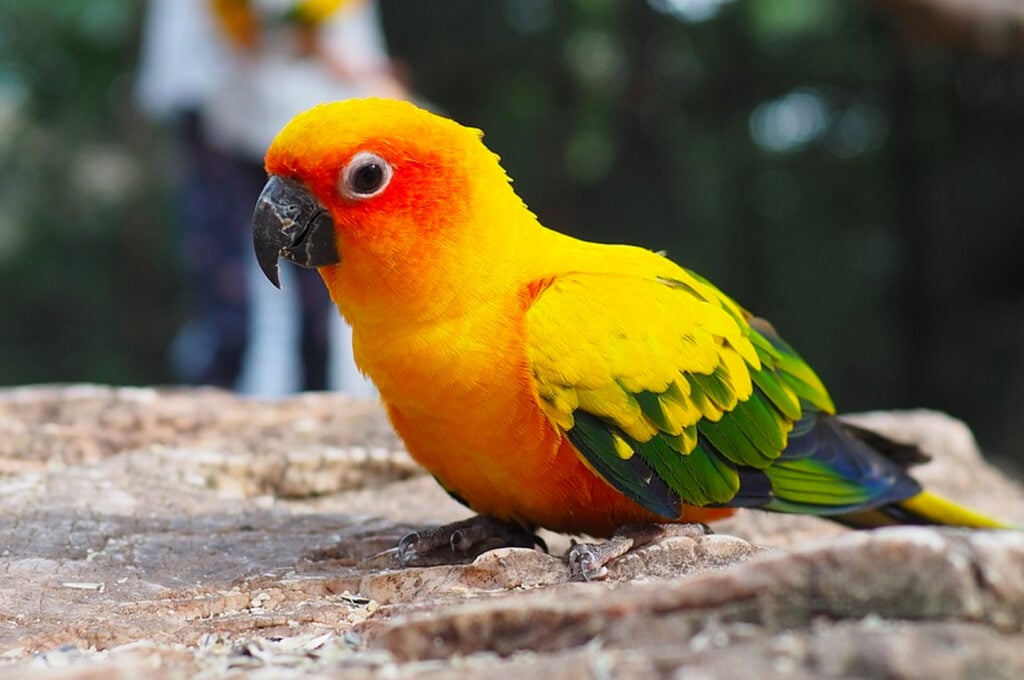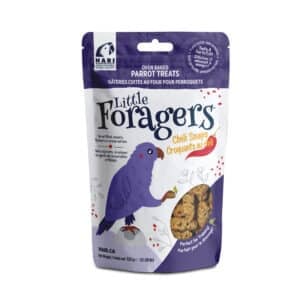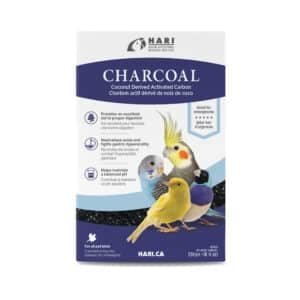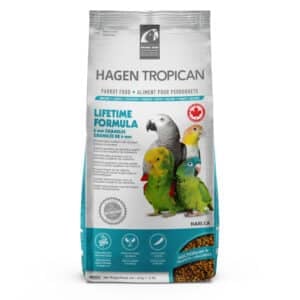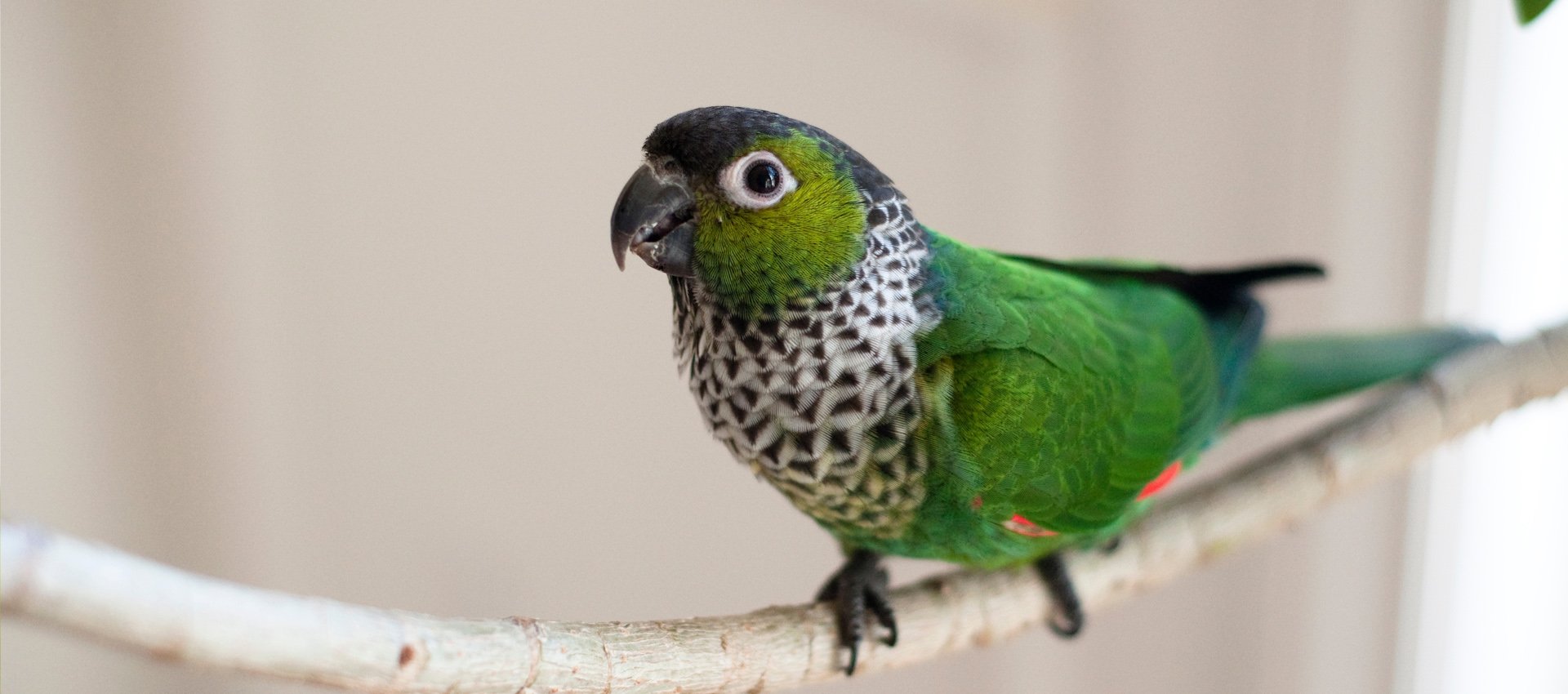Your cart is currently empty!
HARI Official Brand Site
Common Species
Green Cheek (Pyrrhura), Jenday (Aratinga), Blue Crown Conures (Thectocerus), Golden Conures (Guarouba).
Origin/Habitat
Mexico and Central America to the Caribbean and South America
Active, Outgoing, and Adventurous
Conures are a diverse group of small to medium sized parrots that make delightful pets. With their active, playful, and outgoing nature, Conures are the life of the party! They love to have fun and they love to cuddle. Incredibly curious and extremely social, they are notorious for wanting to be where the action is. Conures are smart and capable of learning tricks and speaking a few words, but their vocabularies are not as extensive as other parrot species. These colourful beauties have big personalities, and with their sweet and loving nature they are sure to captivate the heart of any bird lover.
Conures can be found in the wild from parts of Mexico and Central America to the Caribbean and South America. In the wild conures are friendly, peaceful birds and seldom fight with each other. They live together in groups of twenty or more birds, even during the mating season, and feed on various seeds and fruits.
There are multiple species of conures with Green Cheek (Pyrrhura) and Jenday (Aratinga) being the most popular as companions. However, aviary bred Blue Crown Conures (Thectocerus) and Golden Conures (Guarouba) are also popular as companions.
While there are five genera (or groups) of conures, the conures most kept as pets belong to two main groups. The genus Aratinga (meaning “little macaw”) includes some of the larger conures such as Cherry headed, Mitred as well as popular Jenday and Sun conures. The genus Pyrrhura includes the smaller species such as Green cheeked, Maroon Belly, Crimson Belly, Black cap, White eared and Pearly conures. In addition, smaller genera such as Blue Crowns (Thectocerus) and Golden Conures (Guarouba) are also popular pets.
The average lifespan of a conure is 15 to 35 years although some (especially the larger species) have been known to live longer.
Physical Description
They are small to medium sized parrots measuring from 9 to 20 inches in length. While many conures are green, many also have yellow, orange, and red and some even have shades of white, blue and brown.
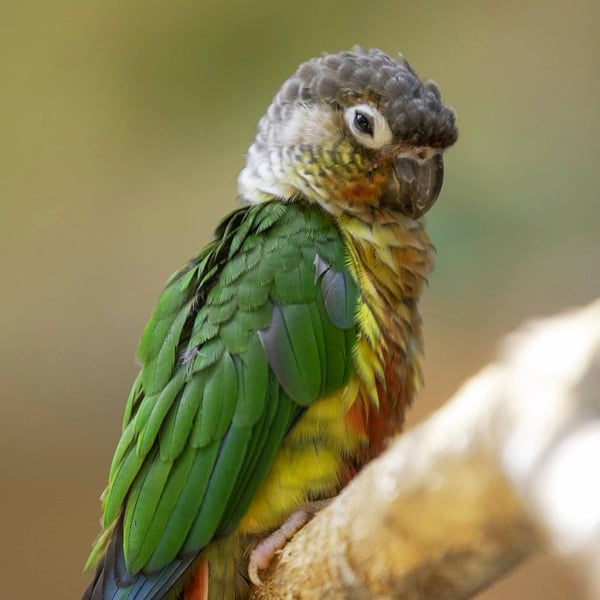
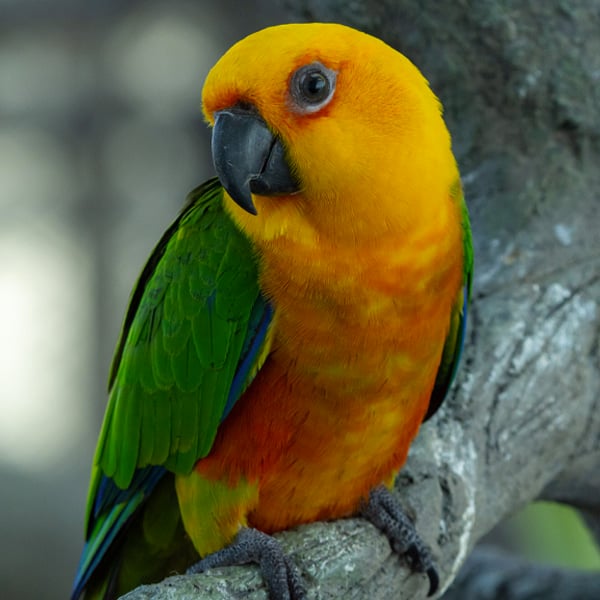
Most conures have slender bodies, and some varieties have short tails that become narrow at the tip while others have long slender tails. They have broad heavy beaks of black or horn color and most have a defined eye ring. The gender of most conures is difficult to determine by physical characteristics alone.
Health Booklet
Keeping track of bird health by recording their growth, development, behavior and environment in a booklet can help ensure that your companion parrot will be healthy and happy for many years to come.
Sex
When it comes to identifying the sex of conures, DNA sexing is the most reliable method. Similar to other parrot species, a DNA blood test conducted by an experienced avian practitioner can be an excellent tool to determine the bird’s sex.
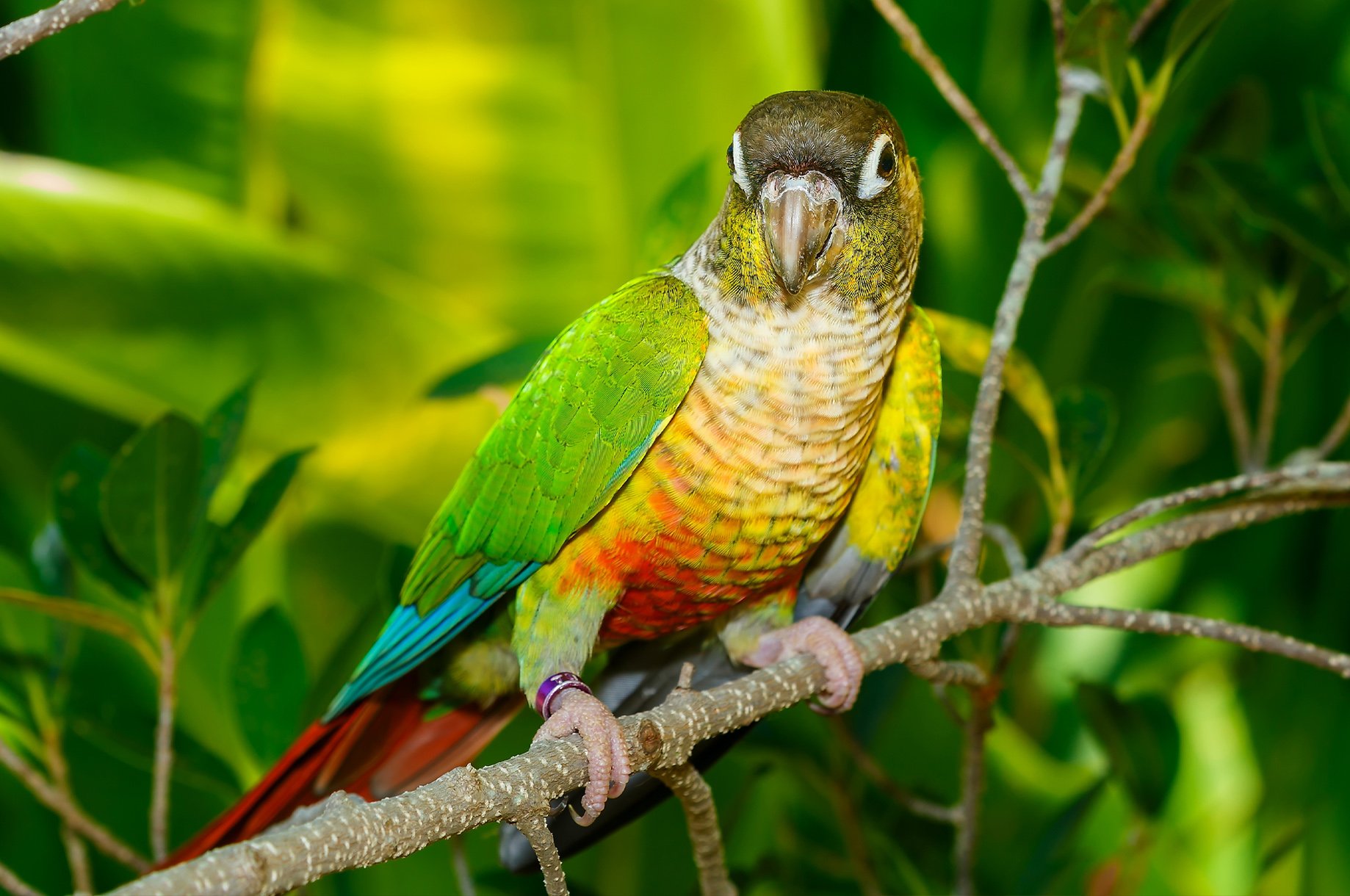
Personality Traits & Behaviours
Conures are known for their high level of curiosity, sociability, and vocal nature. They love to explore their surroundings and require supervision outside of their cage due to their fast and energetic nature. With consistent and trustworthy care, conures respond exceptionally well to training.

Noise Level/Speech/Song
Conures, especially members of the Aratinga, can be very loud birds especially in the mornings and evenings. Conures are not generally good talkers although many delight their humans with some simple phrases and words.

Intelligence & Learning
Conures are one of the most intelligent and trainable species of parrots. They have unique personalities and can be taught several behaviors and tricks. In fact, some conure owners have reported that their pets have learned to mimic human speech and even whistle tunes.
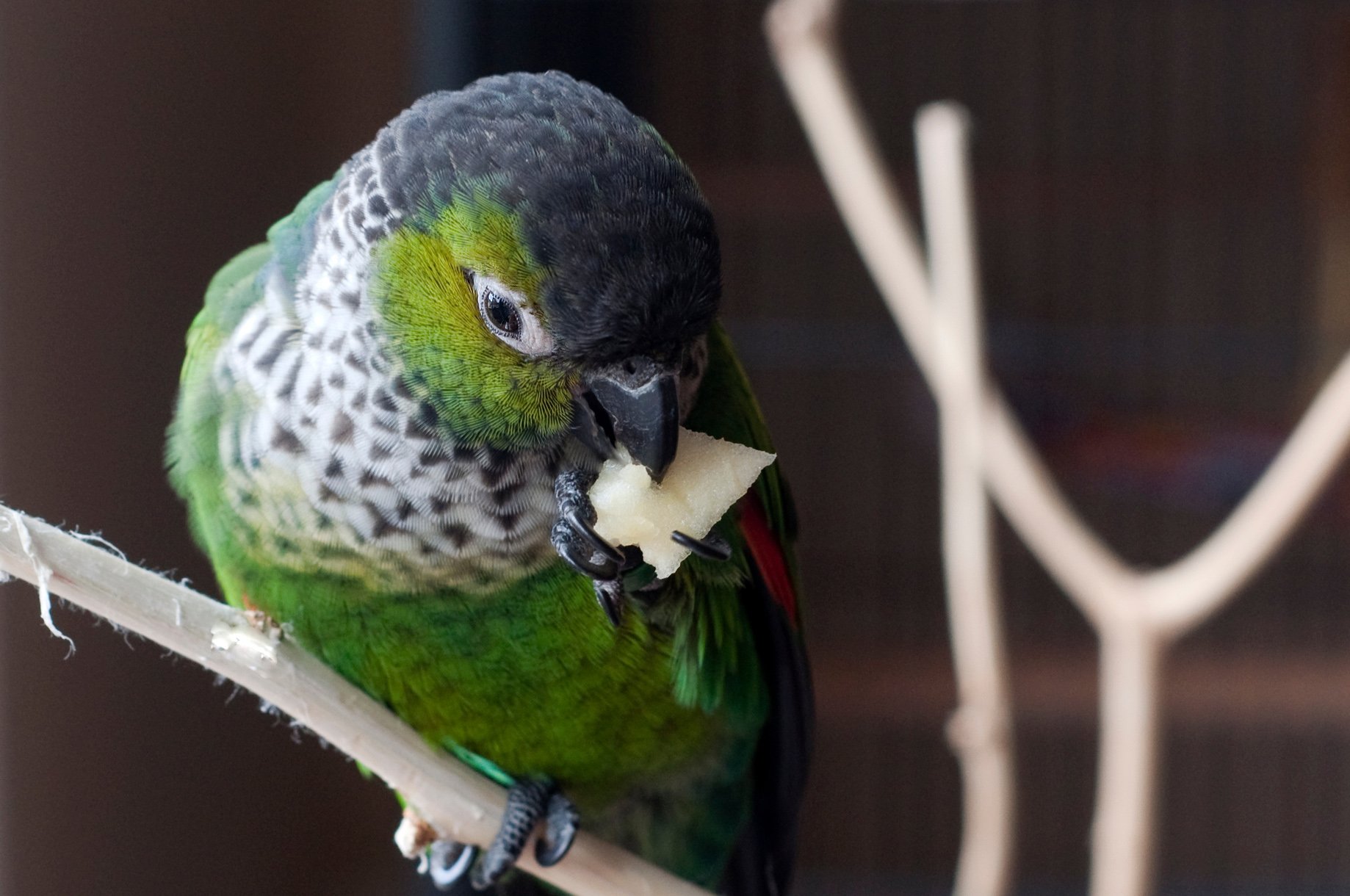
Threats/Conservation
While some species of conures are thriving in the wild, some species, for example, the Sun Conure (Aratinga solstitialis) and the Golden Conure, also known as the Queen of Bavaria (Guaruba guarouba) are critically endangered in their natural habitat.

Relationship with Humans
Regardless of whether a conure is tame or not, they will regard members of the household as part of their flock and will often vocalize in the presence of “their humans.” With a foundation of trust, a conure can also enjoy plenty of cuddle time with their favorite person. Due to their highly social nature, conures thrive on interaction with their owners and are eager to learn new things to please their human companions.
Care
The general rule of thumb when buying a bird cage is to buy the largest cage you can afford. For optimum health and safety, the cage should be at least two and a half times the width of the birds’ wingspan in all directions. Cage bar spacing should never be so wide that your bird could stick his head through, and his tail feathers should not be able to touch the bars when he is perched comfortably. Also consider your bird’s beak strength to determine the proper gauge of the bars as some birds have been known to bend the bars and escape.
A rectangular cage with horizontal bars in which your bird has plenty of room to climb and play is the best environment for your parrot. Your parrot will be happiest in a well-ventilated room with as much natural light as possible, yet away from direct sunlight and drafts. Your bird will want to be part of the action but not right in the middle of it. Avoid placing your bird’s cage in the kitchen as there are many hazards including vapors from heated PTFE coated pans (PTFE is better known as TeflonTM), hot stoves, pots of boiling water, and cooking fumes all of which can be very harmful to your bird. The cage and accessories should be thoroughly cleaned and disinfected weekly. Make sure your bird stays healthy by providing them with fresh food and water every day. Don’t forget to wash their dishes daily!
Time out of the cage every day for socialization and exercise is important. Parrots enjoy supervised activities on a play gym loaded with their favorite toys and enrichment food. Make sure he does not have access to open doors or windows, toilets with the lid up, hot stoves, moving ceiling fans or large panes of glass. It’s also a good idea to ensure he does not chew on or ingest anything unsafe such as treated or painted wood or unsafe house plants. Do not keep your bird in a room where sprays such as perfume, hair spray, air fresheners or aerosol sprays are used frequently.
For the safety of your beloved parrot, we advise against leaving them unattended with other pets like dogs, cats, or ferrets.
The basic diet of a Conure consists of a high-quality seed blend such as Gourmet/VME or Tropimix Cockateil & Lovebirds or Small Parrots and formulated diet such as Tropican. We recommend that Conures eat at least a 70% ratio of Tropican Lifetime formula with the remaining 30% of his diet as enrichment food. PRIME Vitamins are also recommended for conures that eat less than 70% Tropican. If you are feeding your bird a pellet-based diet, ask your vet before adding PRIME as you may be feeding too many vitamins (as the pellets are already fortified with vitamins and minerals. Check out our feeding recommendations for most parrot species.
Conures also enjoy fresh enrichments foods such as spinach, kale, romaine lettuce, broccoli, carrot, or apple. These should be washed well and offered to your parrot a few times a week. Always remove any fresh foods within 3 hours to prevent your pet from eating spoiled food.
Avoid salty or sugary foods. Never feed your Conure chocolate, alcohol, caffeine beverages or avocado as even small amounts can be toxic.
Of course, fresh water every day is very important too. Remember to wash and refill your parrot’s water bowl daily to keep your bird healthy and happy.
Many bird owners will cover the bird cage at night to help block out extra light and to provide a setting of security. A cover can also keep the cage warmer (for those living in colder climates).
Your bird’s sleep cage should be outfitted with a comfortable perch placed at the highest level possible to provide security and maintain healthy feet. If your bird is prone to night terrors or you don’t use a cage cover, consider installing an infrared basking light or small night light in the room. Keep in mind that parrots need 10-12 hours of uninterrupted sleep for optimal health.
Improperly sized or dirty perches contribute to Pododermatitis or Bumblefoot. To ensure your bird’s safety and comfort, offer at least three types of perches appropriately sized for their feet. These include cotton or sisal rope and natural wood perches with varying diameters. Natural branches are also great for perching and chewing. Consider using branches like willow, alder, ash, birch, or apple, but replace them every 4-6 weeks and remove the leaves.
It’s crucial to keep your bird’s perches clean to prevent any potential health problems. If you use cotton or sisal rope for perches, regularly inspect them for any signs of fraying or loose strands. Due to normal wear and tear, perches will often need to be replaced. If you use a grooming perch, avoid placing it at the highest level of the cage or near food and water dishes.
It’s no secret that Conures adore toys! However, it’s important to choose toys that are durable, appropriately sized, and provide enrichment. To prevent your feathered friend from getting bored, switch out their toys every one to two weeks. If you’re uncertain about which toys are suitable for your bird, consider Smart.Play and Active.Play toys, which provide recommendations based on their size and needs.
Consistent positive behavior training sessions can be very effective with most Conures. Begin training your bird as early as possible, using simple commands like “step up” and “step down”. Reinforce positive behavior with praise and rewards. Training sessions are best held away from the bird’s main cage, using a training stand and some of their favorite treats.
Socializing your parrot is also important. Introduce them to new people, places, and experiences to help them become accustomed to different situations. Sharing new toys, foods, and environments can help prevent fear and aggression towards strangers. A well-trained and well-socialized Conure can make a great companion for years to come.
Daily bathing is essential to the health of your bird. Bathing moisturizes nasal passages and feet and keeps your birds’ feathers and skin in excellent shape. Conures will often bathe on their own if opportunity is available. If your bird is reluctant to bathe on his own, you can use a spray bottle with warm water to gently mist him or use a shower perch. Be sure to remove seeds or pellets from the cage before misting as damp food can grow mold and bacteria. Always bathe your bird early in the day and let him dry naturally in a draft free area.
While trimming a Conure’s flight feathers is optional, most owners prefer to keep the wings trimmed for safety reasons. Trimming the feathers is a simple and painless process, similar to getting a haircut. By ensuring that your bird cannot fly too high but can still glide down safely, you will create a safer environment for both you and your pet. It is important to manage your bird’s flight feathers properly, especially during molting season, and to regularly inspect and groom their toenails. To avoid accidents, it is highly recommended that you consult a professional bird groomer to trim the feathers and nails. Wing trimming does not guarantee that your bird will not fly, but it can certainly help. Even with trimmed wings, one or two grown-in feathers can still give your Conure flight capability. That’s why it is essential to never take your Conure outside without a secure cage or a properly fitted bird harness.
It is important to provide parrots with a safe environment to ensure the longest lifespan. The following is a list of common household dangers: Non-stick surfaces (like TeflonTM coated pans), oven cleaner and self-cleaning ovens, cigarette Smoke, paint and paint fumes, scented candles, household cleaners, floor polish, hairspray, chlorine bleach, perfume, aerosol sprays, nail polish and nail polish remover fumes and ingesting harmful or toxic house plants. It’s important to educate everyone in the household about food and other items that may be poisonous to parrots, such as avocados, chocolate, coffee beans, onions, salt, and fruit seeds or pits. Additionally, ceiling fans, cupboards, blinds, open doors, and windows all pose potential risks for your pet, as they may fly into them, get trapped, or simply fly away.
Birds are known to mask signs of sickness, so it’s important to monitor your feathered friend for any subtle changes in their behavior or health. One way to ensure your Conure is in top shape is to schedule an annual visit with a veterinarian for a comprehensive evaluation and preventative healthcare plan. You may want to consider an avian vet or an exotic pet specialist, as some clinics only offer routine bird appointments and refer more complex cases to avian veterinarians. An avian vet can also offer valuable advice on how to provide proper healthcare for your bird.
Availability in the Pet Market
Conures can be obtained from an avian specialty shop, pet dealer, or a reputable breeder. Online adoption organizations and rescues can also be a viable option for those looking to adopt a Conure.
Some conures species will hybridize that result in beautiful colors such as a “Sunday”, a cross between a Jenday and a Sun Conure.
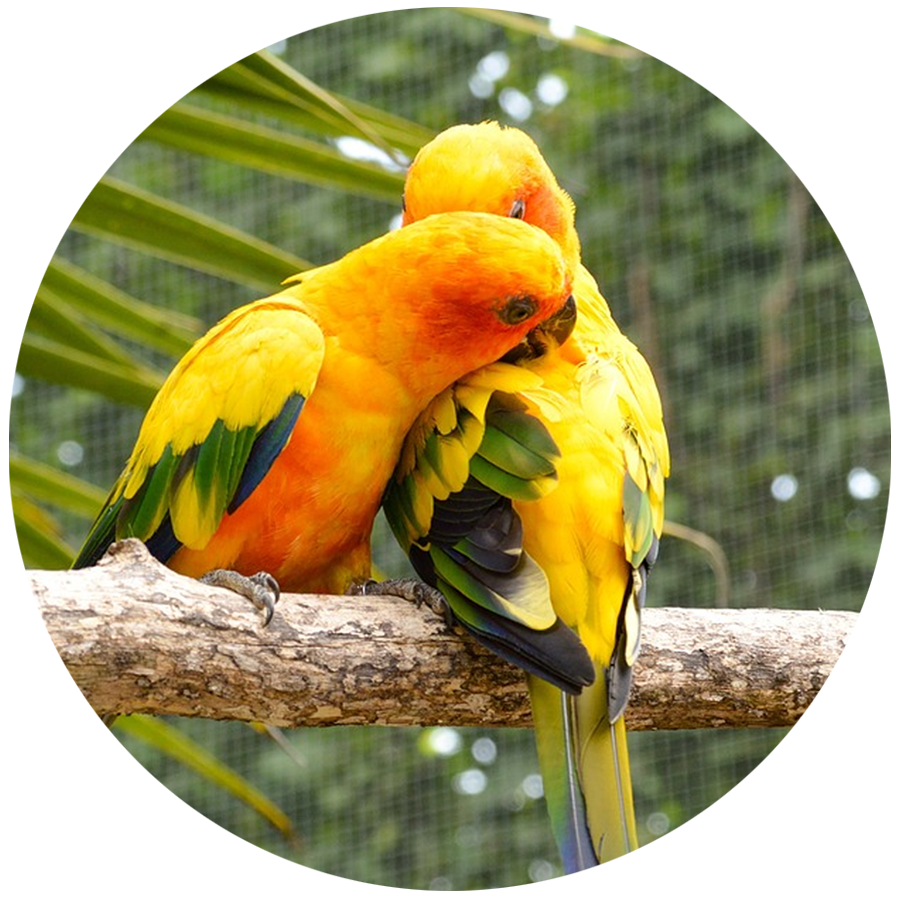
Aviculture
Breeding Habits
Commonly, conure species breed in the wild during the Spring and Summer months, laying between 2 to 5 eggs per clutch. However, when in captivity, many species lay eggs consistently throughout the year, with an average of 4 eggs per clutch. Most conures reach maturity at 2 years of age, though larger species may not mature until 3-4 years old.
Hatchling to Fledgling
Most aviculturists catering to the pet bird trade prefer to have parent birds raise their young for about two to three weeks before beginning hand feeding. Breeding Conures should be in optimal health and receive proper nutrition to support the needs of both the “expectant” parents and the nestlings. Tropican High Performance 4mm, 8mm, Sticks and Tropimix Small & Large Parrot are excellent options, as well as vegetables and fruits high in beta-carotene to meet the nutritional needs of breeding parrots. Adding Prime Vitamins to the diet can also benefit breeding pairs on a predominately seed-based diet.
Suggested Products
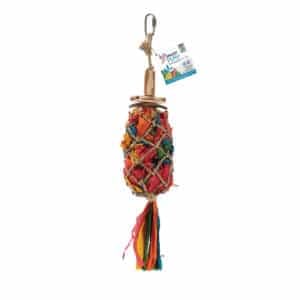
Smart.Play
Catch of the Day, Enrichment Parrot Toy for Small to Medium Birds
Enrichment Parrot Toy for Small to Medium Birds

